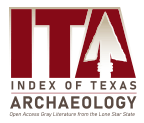Home > Research Projects and Centers > Center for Regional Heritage Research > Index of Texas Archaeology > Vol.
Article Title
Archaeological Survey of the Proposed Tomball Tollway Project, Montgomery County, Texas
Agency
Texas Historical Commission
Abstract
On behalf of Halff Associates, Inc., and the Montgomery County Toll Road Authority (MCTRA), SWCA Environmental Consultants (SWCA) conducted an investigation of the proposed Tomball Tollway project located in Montgomery County, Texas. The proposed project area follows the existing Tomball Tollway (State Highway [SH] 249) northward approximately 3.3 miles from Spring Creek to the FM 1774 junction in Pinehurst. The proposed project involves the widening of SH 249 between existing feeders, as well as the construction of on-ramps. The project also involves the construction of three detention basins totaling approximately 22 acres utilizing a combination of floodplain fill mitigation and detention. The investigations included an archaeological background literature and records review and an intensive pedestrian survey augmented by subsurface shovel and auger testing to systematically identify, record, delineate, and, if possible, determine the significance of any cultural resources located within the project area. All work was conducted under Texas Antiquities Code permit number 7505 in compliance with the Antiquities Code of Texas. Archaeological investigations were conducted as part of the sponsor’s compliance with application requirements for a U.S. Army Corps of Engineers (USACE) Galveston District, Section 404 permit in accordance with 33 Code of Federal Regulations (CFR) Part 325, Appendix C (Processing Department of Army Permits: Procedures for the Protection of Historic Properties; Final Rule 1990; with current Interim Guidance Documents dated April 25, 2005 and January 31, 2007), and Section 106 of the National Historic Preservation Act (NHPA) (16 United States Code [USC] 470) and its implementing regulations (36 CFR 800). All investigations were conducted in accordance with the standards and guidelines of the NHPA, the Texas Historical Commission’s (THC) standards for such projects, and the Council of Texas Archeologists Guidelines for Performance, Curation, and Reports.
The goal of the work was to locate all prehistoric and historic archaeological sites in the project area, establish vertical and horizontal site boundaries as appropriate, and evaluate the significance and eligibility of any site recorded for listing in the National Register of Historic Places (NRHP). Overall, investigations in the proposed project corridor encountered ground disturbances resulting from prior road and transmission line construction and maintenance activities.
As a result of the current investigation, one multicomponent site (41MQ326) was discovered and delineated using THC standards. Due to the paucity of artifacts, SWCA believes it is unlikely that significant archaeological materials exist within the investigated portions of 41MQ326; however, due to the depth of deposits and possibility of deeply buried features not visible through augering, NRHP eligibility for 41MQ326 is UNDETERMINED for listing in the National Register of Historic Places (NRHP) (36 CFR 60.4 [a-d]) or as a State Archaeological Landmark (SAL), and further research is needed to fully assess the site. As such, SWCA advises that archaeological monitoring take place during construction of the southern detention basin in areas within 30 m of the site in order to further evaluate this portion of the site and to ensure that no significant archaeological deposits are disturbed.
In accordance with 33 CFR Part 325, Appendix C and Section 106 of the NHPA (36 CFR 800.4), SWCA has made a reasonable and good faith effort to identify historic properties within the proposed Tomball Tollway project area. Based on the results of the current effort and proposed monitoring, SWCA recommends a determination of NO ADVERSE EFFECT to historic properties within the investigated project area.
Creative Commons License

This work is licensed under a Creative Commons Attribution-NonCommercial 4.0 International License
Included in
American Material Culture Commons, Archaeological Anthropology Commons, Environmental Studies Commons, Other American Studies Commons, Other Arts and Humanities Commons, Other History of Art, Architecture, and Archaeology Commons, United States History Commons
Submission Location
Tell us how this article helped you.


